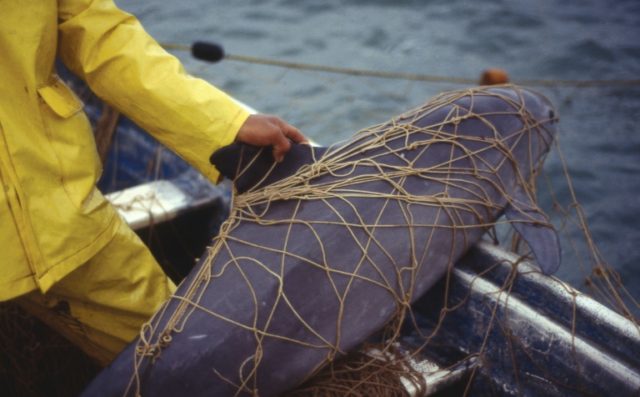Mexico City (AFP) – The World Wildlife Fund urged Mexican authorities to ban all fishing in the upper Gulf of California to save the vaquita marina, the world’s smallest porpoise, from extinction.
The environmentalist group made the plea three days after an international team of scientists revealed that only 60 of the sea creatures were left and that they could vanish by 2022.
“It’s a drastic measure but maybe the most efficient way (to prevent extinction) is to prohibit fishing and obviously compensate fishermen,” WWF’s Mexico director Omar Vidal said at a news conference.
Mexico’s environment ministry did not respond to requests for comment.
President Enrique Pena Nieto imposed a two-year ban on gillnets in April 2015 and increased the vaquita protection area tenfold to 13,000 square kilometers (5,000 square miles).
Pena Nieto also deployed navy reinforcements to police the area.
The vaquita’s fate has been linked to another critically endangered sea creature, the totoaba, a fish that has been illegally caught for its swim bladder, which is dried and sold on the black market in China.
Poachers use illegal gillnets to catch the totoaba. The vaquita, a shy 1.5-meter-long (five-foot) cetacean with dark rings around the eyes, is believed to be the victim of bycatch.
The government is compensating fishermen to the tune of $70 million over two years in order to stop using gillnets while new methods are sought.
But Vidal said the measures have been “insufficient” and that fishermen have “camouflaged” gillnets with other nets.
Banning all fishing immediately, he said, “can save the vaquita.”
Sunshine Antonio Rodriguez Pena, president of the fishing cooperative of the port of San Felipe, said his group would lodge a complaint before the United Nations if a fishing ban were to be imposed.
“They are completely crazy,” he told AFP.
“They should just declare (the vaquita) extinct because fishermen are not killing it,” Rodriguez told AFP, saying other factors are to blame, such as predators, red algae or toxins.
“It’s destined for extinction because this animal is vulnerable to all types of deaths.”

COMMENTS
Please let us know if you're having issues with commenting.